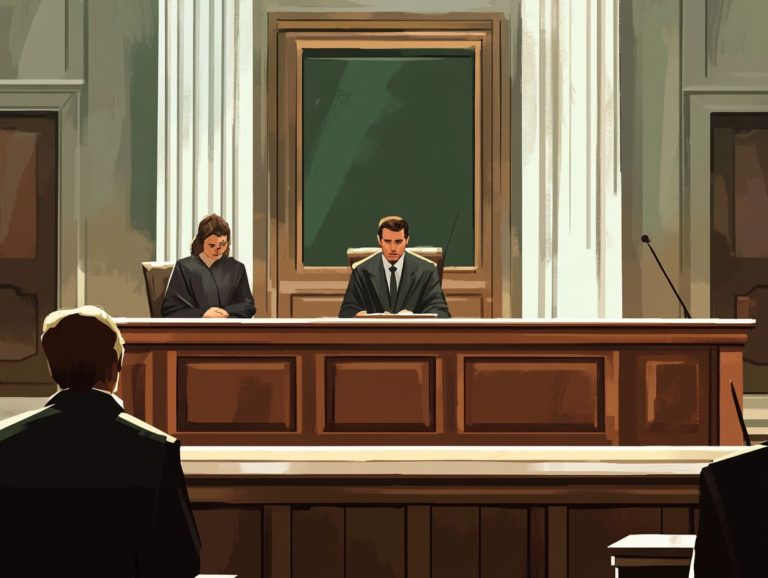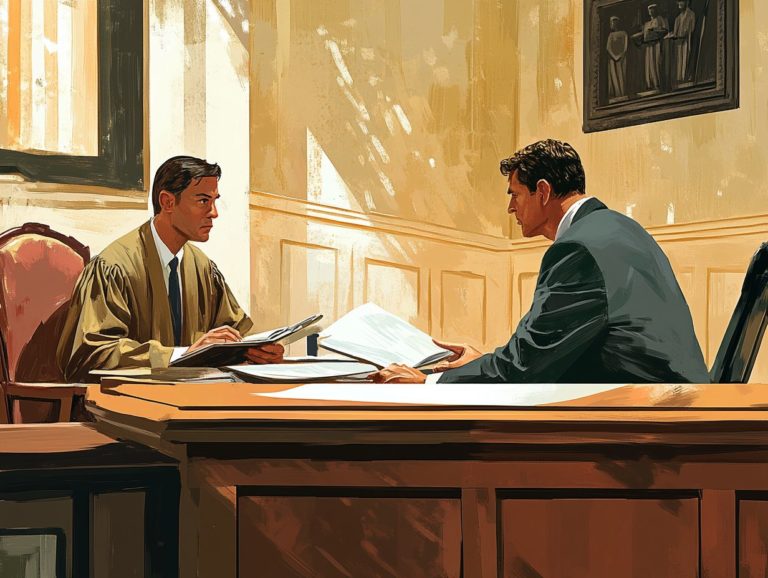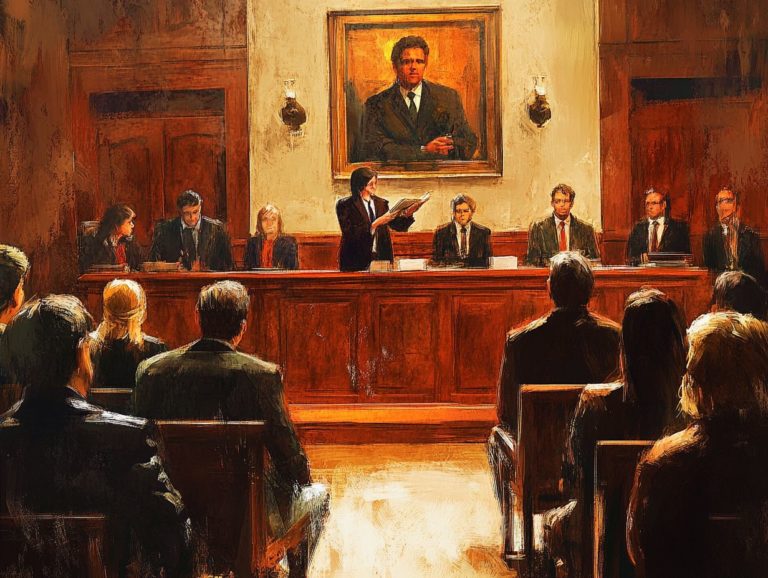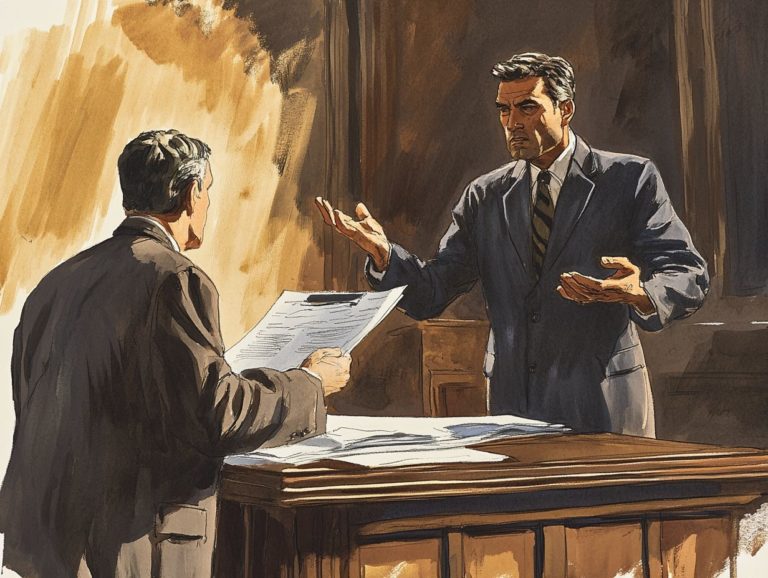The Impact of Legal Ethics on Defense Strategies
Legal ethics serve as the backbone of the legal profession, fundamentally shaping the ways in which defense strategies are crafted and executed.
This discussion delves into the vital role ethics play in defense practice, emphasizing their significance, potential dilemmas, and the ramifications of unethical behavior.
From influencing tactical decisions to protecting both client and professional integrity, understanding the nuances of legal ethics is crucial for every practitioner.
Immerse yourself in the complexities of ethical considerations in defense as you strive for a fair and just legal system.
Contents
- Key Takeaways:
- Understanding Legal Ethics
- Defense Strategies and Legal Ethics
- Common Ethical Dilemmas in Defense Practice
- Consequences of Unethical Defense Strategies
- Navigating Legal Ethics in Defense Practice
- The Role of Legal Ethics in the Justice System
- Preguntas Frecuentes
- 1. C mo afectan la tica legal las estrategias de defensa en los casos judiciales?
- 2. Cu les son algunos ejemplos espec ficos de c mo la tica legal impacta las estrategias de defensa?
- 3. C mo pueden los abogados equilibrar la tica legal y su deber de defender en rgicamente a sus clientes?
- 4. Puede la tica legal entrar en conflicto con una estrategia de defensa?
- 5. C mo impactan las reglas de conducta profesional las estrategias de defensa en casos penales?
- 6. Qu pasa si un abogado viola la tica legal en su estrategia de defensa?
Key Takeaways:

Legal ethics are crucial in defense practice, as they ensure fairness and integrity are upheld in the justice system. Understanding legal ethics is essential for defense attorneys, as it influences their defense strategies and decisions. Unethical defense strategies can have severe consequences for both clients and legal professionals, highlighting the importance of navigating legal ethics in defense practice.
Understanding Legal Ethics
Understanding legal ethics is vital for maintaining the integrity of the legal profession and ensuring that your clients receive effective assistance and representation within the bounds of the law.
Legal ethics is a set of rules about right and wrong that guides your behavior as a defense attorney and other legal practitioners, ensuring adherence to the ethical standards established by organizations like the NACDL.
This framework is essential not just for your relationship with clients; it’s also crucial for the justice system’s overall functioning in places like California and New York.
Definition and Importance
Legal ethics includes the standards of conduct that govern your behavior as an attorney, ensuring your actions align with professional responsibilities and ethical considerations.
These standards are vital for preserving the integrity of the legal profession and protecting the fundamental rights of your clients.
Upholding attorney-client privilege means that what you discuss with your lawyer stays confidential. This allows clients to communicate freely without fear of disclosure, creating an atmosphere of trust that is essential for effective legal representation.
The Sixth Amendment is a part of the U.S. Constitution that guarantees you the right to a lawyer, highlighting the significance of ethical practices in the pursuit of justice.
Various legal organizations, such as the American Bar Association, play a pivotal role in establishing and promoting these ethical guidelines. They propose consequences for attorneys who violate these standards, which can range from disciplinary action to loss of licensure or even criminal charges, reinforcing the imperative of maintaining ethical integrity within the legal system.
Defense Strategies and Legal Ethics
In the realm of criminal law, your defense strategies must be meticulously crafted within the confines of legal ethics. This approach helps you assist your clients effectively while navigating intricate ethical dilemmas that may arise along the way.
How Ethics Influence Defense Tactics
Ethics play a crucial role in shaping your defense tactics, guiding you in making legal decisions that uphold your professional obligations while protecting your clients’ rights.
By adhering to ethical guidelines, you aim for favorable outcomes and maintain the integrity of the judicial process. For instance, when advising clients on plea deals, you must carefully weigh the potential repercussions of a guilty plea against the risks of going to trial, ensuring your clients fully grasp the implications for their future.
Ethical considerations influence how you examine witnesses as well. You’re required to treat them with respect, avoiding coercive tactics that could undermine their credibility.
The commitment to confidentiality is paramount; breaches can lead to severe consequences, eroding trust and potentially jeopardizing your client’s case in the courtroom.
Common Ethical Dilemmas in Defense Practice

Defense attorneys often find themselves navigating ethical dilemmas that test their ability to balance client interests with their professional responsibilities.
This delicate tightrope can lead to conflicts of interest and the potential for misconduct, requiring a keen awareness and careful consideration of their obligations.
Don t just understand legal ethics embrace them to champion justice!
Examples and Implications
You ll encounter many examples of ethical dilemmas in defense work. These illustrate the complex landscape attorneys navigate, especially concerning client confidentiality.
For example, what happens when an attorney finds out their client lied under oath? They must decide whether to disclose this, risking client confidentiality, or act in a way that might compromise justice.
Representing a client who seems guilty raises significant ethical questions. You need to protect your client s rights while also upholding the legal system’s integrity.
These dilemmas can strain the attorney-client relationship and impact the ethical standards of the legal profession. It s crucial for legal practitioners to navigate these waters with care and integrity.
Consequences of Unethical Defense Strategies
Unethical defense strategies can have serious repercussions. They can damage your professional reputation and undermine your clients’ rights.
Risks to Clients and Legal Professionals
When defense strategies fail ethical standards, both clients and attorneys face significant risks. Trust can break down, leading to potential legal consequences.
For clients, this could mean wrongful convictions or unfair trials, resulting in severe personal and financial consequences. The emotional toll can also leave lasting stigmas.
Attorneys can face reputational damage, risking their careers. Legal penalties range from sanctions to disbarment, emphasizing the need for ethical practice.
By upholding these principles, both clients and lawyers can promote a fairer legal system.
Navigating legal ethics requires understanding complex guidelines and best practices. You must ensure your obligations align with your clients’ rights.
This balance is key to maintaining trust and integrity in your professional relationships. When you do this, you not only uphold legal standards but also advocate effectively for your clients.
Best Practices and Resources

To maintain legal ethics in your practice, prioritize ongoing education and adherence to established standards. Stay informed about changes in legal ethics.
Engage in continuous professional development. Attend workshops and seminars focused on recent legal changes and ethical considerations.
Seek advice from ethical advisory committees for insights into challenging dilemmas. Use resources from reputable legal organizations to foster an ethical culture.
By staying updated on evolving standards, you enhance your practice and reinforce the integrity of the legal system.
The Role of Legal Ethics in the Justice System
Legal ethics are essential to the justice system. They uphold integrity and ensure fair trials while guiding defense counsel in criminal proceedings.
Your understanding of these principles is vital for maintaining the system’s credibility and effectively serving justice.
Promoting Fairness and Integrity
Promoting fairness and integrity within the legal system demands that you, as a defense attorney, commit to ethical practices that uphold your professional responsibilities and your clients’ interests.
By fostering a relationship grounded in trust, you enable your clients to engage openly. This ensures that every pertinent detail is shared, which is essential for effective representation.
When you prioritize honest communication over manipulation or deceit, you uphold ethical standards. You also pave the way for a robust defense strategy.
This commitment shows when you refuse to present false evidence or mislead the court. Such principles enhance your credibility as a legal practitioner and contribute to a balanced and just legal system, ultimately benefiting society.
Preguntas Frecuentes
1. C mo afectan la tica legal las estrategias de defensa en los casos judiciales?
La tica legal es esencial en la formaci n de estrategias de defensa en los casos judiciales. Los abogados deben seguir c digos de conducta y est ndares ticos que gu an sus acciones al representar a sus clientes.
2. Cu les son algunos ejemplos espec ficos de c mo la tica legal impacta las estrategias de defensa?

Un ejemplo es la responsabilidad de mantener la confidencialidad, que impide a los abogados revelar informaci n compartida por sus clientes. Esto puede limitar el tipo y la cantidad de evidencia que se puede utilizar en una defensa.
Otro ejemplo es el deber de defensa activa, que exige que los abogados act en en el mejor inter s de sus clientes dentro de la ley.
3. C mo pueden los abogados equilibrar la tica legal y su deber de defender en rgicamente a sus clientes?
Los abogados deben equilibrar sus obligaciones ticas y su papel como defensores de sus clientes. Pueden lograr esto al investigar y entender a fondo el caso, construyendo una defensa s lida basada en la evidencia y present ndola de manera tica.
4. Puede la tica legal entrar en conflicto con una estrategia de defensa?
S , la tica legal puede entrar en conflicto con una estrategia de defensa. Por ejemplo, si un abogado descubre evidencia que podr a incriminar a su cliente, se enfrenta al dilema de si revelarla o mantener la confidencialidad.
En tales situaciones, los abogados deben navegar cuidadosamente para cumplir con sus obligaciones ticas mientras proporcionan una defensa s lida.
5. C mo impactan las reglas de conducta profesional las estrategias de defensa en casos penales?
Las reglas de conducta profesional, basadas en la tica legal, impactan significativamente las estrategias de defensa en casos penales. Los abogados deben adherirse a estas reglas y no participar en comportamientos poco ticos o ilegales.
Esto puede afectar el tipo de estrategias de defensa y la evidencia que se puede presentar.
6. Qu pasa si un abogado viola la tica legal en su estrategia de defensa?
Si un abogado viola la tica legal en su estrategia de defensa, puede enfrentar acciones disciplinarias por parte de la asociaci n de abogados del estado. Esto puede variar desde una advertencia hasta la suspensi n o inhabilitaci n.
Adem s, la violaci n puede da ar tanto el caso y la reputaci n del cliente como la reputaci n del abogado.






